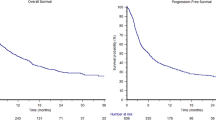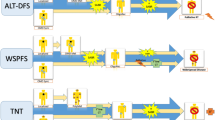Opinion statement
Metastatic transitional cell carcinoma of the bladder is an aggressive neoplasm characterized by rapid growth and dissemination with a median survival of typically less than 1 year. Despite the availability of a myriad of antineoplastics with moderatesignificant anti-tumor activity yielding overall response rates in the 40% to 80% range, randomized trials continue to demonstrate median survival rates in the 13- to14-month range, with very limited long-term survival. Subsets of patients with advanced bladder cancer present additional management problems, including those with renal insufficiency or nontransitional-cell histology. Various observers have noted the similarity in treatment outcomes in advanced bladder cancer and extensive small cell lung cancer where chemotherapy produces relatively high response rates but with limited impact on survival. The optimal chemotherapy combination for patients with advanced bladder cancer remains undefined, however, there is increasing recognition that in order to achieve tangible improvements in complete response rates and survival in this disease will likely require a combination of chemotherapy and targeted molecular therapies and in some settings adjunctive surgery.
Similar content being viewed by others
References and Recommended Reading
Saxman SB, Propert KJ, Einhorn LH, et al.: Long-term follow-up of a phase III intergroup study of cisplatin alone or in combination with methotrexate, vinblastine, and doxorubicin in patients with metastatic urothelial carcinoma: a cooperative group study. J Clin Oncol 1997, 15:2564–2569. This is an update of the prospective, randomized intergroup trial that established the superiority of MVAC compared with cisplatin, and documented a 3.7% survival of MVAC-treated patients at a median follow-up of 6 years.
Roth BJ, Dreicer R, Einhorn LH, et al.: Significant activity of paclitaxel in advanced transitional cell carcinoma of the urothelium: a phase II trial of the Eastern Cooperative Oncology Group. J Clin Oncol 1994, 12:2264–2270.
Stadler WM, Kuzel T, Roth B, et al.: Phase II study of single-agent gemcitabine in previously untreated patients with metastatic urothelial cancer. J Clin Oncol 1997, 15:3394–3398.
Vaughn DJ, Malkowicz SB: Recent advances in bladder cancer chemotherapy. Cancer Invest 2001, 19:77–85.
Loehrer PJ, Einhorn LH, Elson PJ, et al.: A randomized comparison of cisplatin alone or in combination with methotrexate, vinblastine, and doxorubicin in patients with metastatic urothelial carcinoma: a cooperative group study. J Clin Oncol 1992, 10:1066–1073. The original report of the Intergroup randomized trial establishing MVAC as superior to single-agent cisplatin in advanced urothelial cancer. The investigators noted the role of various prognostic factors in predicting response.
Haleblian GE, Skinner EC, Dickinson MG, et al.: Hydronephrosis as a prognostic indicator in bladder cancer patients. J Urol 1998, 160:2011–2014.
Bajorin DF, Dodd PM, Mazumdar M, et al.: Long-term survival in metastatic transitional cell carcinoma and prognostic factors predicting outcome of therapy. J Clin Oncol 1999, 17:3173–3181. An important paper validating the role of prognostic factors in advanced urothelial cancer. Although clinically recognized for a long period of time, the role of performance status and the presence of visceral metastases in predicting response to chemotherapy was documented by the investigators.
Dreicer R, Manola J, Roth BJ, et al.: Phase II study of cisplatin and paclitaxel in advanced carcinoma of the urothelium: an Eastern Cooperative Oncology Group Study. J Clin Oncol 2000, 18:1058–1061.
Bajorin DF, McCaffrey JA, Dodd PM, et al.: Ifosfamide, paclitaxel, and cisplatin for patients with advanced transitional cell carcinoma of the urothelial tract: Final report of a Phase II trial evaluating two dosing schedules. Cancer 2000, 88:1671–1678.
von der Maase H, Hansen SW, Roberts JT, et al.: Gemcitabine and cisplatin versus methotrexate, vinblastine, doxorubicin, and cisplatin in advanced or metastatic bladder cancer: results of a large, randomized, multinational, multicenter, phase III study. J Clin Oncol 2000, 18:3068–3077. An important randomized trial comparing MVAC with gemcitabine cisplatin. Establishes the gemcitabine cisplatin regimen as a viable alternative to MVAC.
Parameswaran R, Fisch Mj, Ansari RH, et al.: A Hoosier Oncology Group Phase II study of weekly paclitaxel and gemcitabine in advanced transitional cell carcinoma of the bladder. Proc ASCO 2001, 20:200a.
Bellmunt J, Guillem V, Paz-Ares L, et al.: A phase II trial of paclitaxel, cisplatin, and gemcitabine in patients with advanced transitional cell carcinoma of the urothelium. Proc ASCO 1999, 18:322a.
Vaishampayan U, Smith D, Redman B, et al.: Phase II evaluation of carboplatin, paclitaxel and gemcitabine in advanced urothelial carcinoma. Proc ASCO 1999, 18:333a.
Honnens de Lichtenberg M, Miskowiak J, Rolff H: Results of radiotherapy on ureteric obstruction in muscle-invasive bladder cancer. Br J Urol 1995, 75:197–199.
Leibovitch I, Ben-Chaim J, Ramon J, et al.: The significance of ureteral obstruction in invasive transitional cell carcinoma of the urinary bladder. J Surg Oncol 1993, 52:31–35.
Dreicer R, Gustin DM, See WA, et al.: Paclitaxel in advanced urothelial carcinoma: Its role in patients with renal insufficiency and as salvage therapy. J Urol 1996, 156:1606–1608.
Vaughn D, Dreicer R, Manola J, et al.: E2896 Paclitaxel/ Carboplatin in advanced urothelial carcinoma and renal insufficiency A phase II trial of the Eastern Cooperative Group. Proc ASCO 2000, 19:343a.
Venook AP, Egorin MJ, Rosner GL, et al.: Phase I and pharmacokinetic trial of gemcitabine in patients with hepatic or renal dysfunction: Cancer and Leukemia Group B 9565. J Clin Oncol 2000, 18:2780–2787.
See WA, Dreicer R, Cohen MB: Adult tumors of the ureter and bladder. In Management of Urologic Disorders. Edited by Bahnson RR. London: Wolfe Publishing, Ltd.; 1994:4.2–4.25.
Corral DA, Sella A, Pettaway CA, et al.: Combination chemotherapy for metastatic or locally advanced genitourinary squamous cell carcinoma: a phase II study of methotrexate, cisplatin and bleomycin. J Urol 1998, 160:1770–1774.
Russell J, Griffiths G, Uscinska B, et al.: A phase II trial of cisplatin, methotrexate, and vinblastine chemotherapy for pure squamous cell carcinoma of the urinary tract. Proc ASCO 2001, 20:191a.
Einhorn LH, Roth BJ, Ansari R, et al.: Phase II trial of vinblastine, ifosfamide and gallium combination chemotherapy in metastatic urothelial carcinoma. J Clin Oncol 1994, 12:2271–2276.
Abbas F, Civantos F, Benedetto P, et al.: Small cell carcinoma of the bladder and prostate. Urology 1995, 46:617–630.
Lohrisch C, Murray N, Pickles T, et al.: Small cell carcinoma of the bladder: long term outcome with integrated chemoradiation. Cancer 1999, 86:2346–2352.
Herr HW, Donat M, Bajorin DF: Post-chemotherapy surgery in patients with unresectable or regionally metastatic bladder cancer. J Urol 2001, 165:811–814. An important experience from a single institution defining the utility of surgical resection in selected patients with locally advanced bladder cancer responding to chemotherapy.
Otto T, Krege S, Suhr J, et al.: Impact of surgical resection of bladder cancer metastases refractory to systemic therapy on performance score: A phase II trial. Urology 2001, 57:55–59.
Dodd PM, McCaffrey JA, Hilton S, et al.: Phase I evaluation of sequential doxorubicin gemcitabine then ifosfamide paclitaxel cisplatin for patients with unresectable or metastatic transitional cell carcinoma of the urothelial tract. J Clin Oncol 2000, 18:840–846.
Winquist E, Moore MJ, Chi K, et al.: A phase II study of a farnesyl transferase inhibitor (SCH 66336) in patients with unresectable or metastatic transitional cell carcinoma of the urothelial tract failing prior chemotherapy. Proc ASCO 2001, 20:197a.
Author information
Authors and Affiliations
Rights and permissions
About this article
Cite this article
Dreicer, R. Locally advanced and metastatic bladder cancer. Curr. Treat. Options in Oncol. 2, 431–436 (2001). https://doi.org/10.1007/s11864-001-0048-y
Issue Date:
DOI: https://doi.org/10.1007/s11864-001-0048-y




